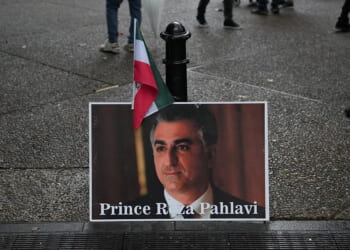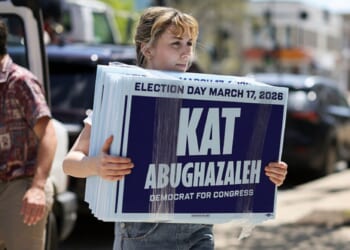“Let’s move to Faversham” announced The Guardian in 2014, envisaging a place for London’s priced-out middle classes to live out a peaceful bohemian existence by the “quirky and historic” quayside. Last Saturday afternoon, in its cobbled medieval core, those who’d heard the call were sipping drinks outside an Italian wine bar — slowly becoming aware that gathering at the top of the market was something about to turn their world upside down.
Market stalls selling suet pudding and old copies of Hillary Mantel started shaking to the sound of Vera Lynn’s “There’ll Always Be An England”. At five past one, down they came: a swaggering, carnivalesque procession of red and white, horns and whistles. The Faversham middle classes, some who had adorned “Lefty” badges to make it clear they were most definitely not part of this spectacle, looked on with horror and trepidation.
“Some silly bint threw water at us,” said a gleeful, puffed-out man, holding aloft a billowing St George’s Cross that would not have looked out of place on the Third Crusade. Today he had come, like 100 or so others, because he was “fed up of sitting on his sofa and not doing anything while the country fell apart”.
This was the third protest in Faversham since the summer of flags, one which seems to have dredged up the town’s — and the county’s — deepest divides. Faversham lies just south of a no man’s land of Dickensian marshes. To one side are the Medway towns, gradually blending into London’s Zone-5 sprawl. To the other lies Thanet, a spiritually renowned corner of Kent made famous by David Seabrook, the crime writer and Proust scholar fascinated by its faded Carry On stars and strain of occult far-Right politics.
Since the 1900s, Faversham has attracted waves of Cockneys to its hop farm and local brewery — the oldest in the country — who have come to form a tight community in its villages and housing estates. It’s a settlement that one former resident likened to the mosquito trapped in amber in Jurassic Park, waiting to unleash the DNA of a long-forgotten East End into the Kent hinterland. Into this world, perhaps unwittingly, have come the recent “Down from Londoners”. This has led to an interesting if incongruous mix. Bob Geldof lives in a Benedictine nunnery, a stone’s throw from a council estate where jolly men in white vans toot horns at neighbours and discreetly sell them drugs. Flags — Palestinian, Union Jack and the Saint George’s Cross — delineate a sort of informal segregation.
The civic life of Faversham is dominated by a progressive set of Lib Dems and Greens, now bolstered by a parapolitical body known as “Faversham Against Racism”. It was set up to counter another group — “National Emergency Faversham Division” — which have helped organise this weekend’s march. Local politics are no longer about bins, but a battle for the town’s soul that echoes far beyond the Kent countryside. If you want to understand the forces unleashed when a political order dies, the two-party system fragments, and a shared reality collapses into future visions wavering between a multicultural paradise and all-out civil war, then visit Faversham.
Despite all this, locals still insist Faversham is still a lovely place. And they’re right. Yet it’s this undeniable charm that makes it all the more unnerving — even relatable — when trouble does flare: scuffles outside the artisan butcher, a Labour councillor’s window smashed in. A place that seems to linger between the Cotswolds and the start of a J.G Ballard short story about what happens when the precarious fabric that holds together provincial life in Kent life starts to unravel.
All this seems to have stirred something deep within the locals. Samantha, a gently spoken woman in her thirties, was putting up “international bunting” on the morning of the first protest back in October when one of the protestors accused her of being a paedophile. Something inside her clicked. A week later she was standing in a car park with three other strangers in the early hours of the morning, determined to put what had been unleashed over the summer back in its bottle.
“The Ninjas”, as they’re affectionately known, have so far taken down over 400 crosses of St George. In other parts of the country, councils have leant on shady men in vans to take them down. But this highly sophisticated operation is not only done for free but against the will of Reform-run Kent County Council, which insisted the flags stay up. It sees them run decoys, share knowledge with surrounding towns and end up in standoffs on A-roads.“It’s just very upsetting to see lots of flags that were put up by an organisation of known fascists and racists,” says Samantha, who sees a fringe minority exploiting the grievances of the town. “I didn’t think that was who we were in this country.”
But in Faversham, this particular attempt to abate the tension doesn’t seem to have worked. “Lefty scum, off our street” chant the protesters as they sweep through town. “Fuck off” roars a plump, James May lookalike outside one historic pub. “I hope someone gives them a kicking,” he cries as the rearguard of protesting mobility scooters whizzes past. Up ahead, a crew from CNN are angling to get a picture of their leader, a smart man in a black peacoat, who looks like a guilty estate agent about to go on trial.
It’s Harry Hilden, who, depending on whether you live in a Victorian semi or one of the town’s suburban estates, is either the devil incarnate or a local hero. He’s one of Faversham’s, and indeed England’s, more foreboding creations since last summer. God and Mixed Martial Arts are his hobbies; as a teenager he was jailed for gang violence, though there’s no evidence his later activism is anything but peaceful. Indeed, he’s amassed 11,000 Facebook followers, or half the population of Faversham, through a mixture of neighbourhood-watch-style posts and Rupert Lowe impersonations, all leavened by a vision of England re-Christianised by AI-generated holy warriors. Just this week, he was in Poland on its independence march, and it’s this ritual of unabashed nationalism that Hilden now intends to bring to Faversham on a Saturday afternoon.
“Harry Hilden is either the devil incarnate or a local hero.”
Local critics argue that Hilden is just a short-lived social media nightmare, destined either to be swept aside by Labour’s promised reform of the asylum system, or else nobbled by the authorities. But as we head to Acacia Court, a former care home and now asylum accommodation for unaccompanied minors that straddles one of the town’s estates, a more complex dynamic of support emerges.
On the estate, a sprawling monotone suburb that’s a far cry from quaint Faversham, families have gathered on their front lawns in support. “The community doesn’t feel safe,” says Dawn, 42, watching from her front lawn as a car emblazoned with “Stop The Boats” pulls up. “This is all happening because people don’t feel like they’re being heard,” she continues, alleging problems with older teenagers staying at the hotel “ogling girls” and asking locals to buy them alcohol. “We’re a tight knit community and Harry is standing up for us. I think he’s a local hero.”
The Faversham protest is redirected by police, away from a thin grey line singing in gentle harmony outside the asylum accommodation. Just up the road, a family of four come out on the lawn and watch the counter-protest. “Those upper-class idiots don’t understand what’s happening up here,” says the father, an easy-going man with a beer belly. They would have joined the protest, but they’re worried about their jobs. Is their support for the protest just about the asylum hotel? “I think everyone is just fed up,” says the father. “I expect Reform will win the next election and get a grip on immigration, but then they’ll find another way to screw us over.”
Around the corner just outside the asylum accommodation, CNN is trying to interview Paul Golding, a former BNP man who has a grimmer prophecy. “I believe violence is inevitable against what’s happening to the English,” he tells the flustered-looking American reporter. In the background, “MissusKent”, another political influencer who has emerged since the summer, is singing what sounds like Lily Allen if she were interested in mass deportations.
Hilden addresses the crowd. “Be more like Poland!” he tells the small gathering. “You can see how much they love their country in their eyes.” Hilden has his fans. “I got to shake his hand!” says an excited young boy with his mum. As that cynical father implies, across the estate this is about more than Reform, whose rise people here seem broadly indifferent to. Rather, it’s Tommy Robinson’s march on London in September that changed everything. And if Robinson, in Britain’s fraying multicultural settlement, is now regarded as a “community leader” for sections of the white working class, then Hilden can perhaps be seen as the local chapter of that new interest.
It’s a response to the rise of other sectarian political influencers, who now speak for Britain’s multicultural tribes as the old Westminster system collapses. And stylistically, it’s no different. Whether it’s Akhmed Yakoob in Ladywood, or Harry Hilden in Faversham, both waver between bolshy street-level provocation and cosy community sermons built on vague appeals to family and faith. Taken together, it’s a quasi-theocratic, communal identitarianism bubbling up from the provinces, and which Westminster politics has no means of mediating. Here the democratic individual has been subsumed into the post-democratic “interests” of the local community, mobilised along ethnic and religious lines in an attempt to assert their interests in anticipation of the coming collapse of the present political establishment.
All the while, politicians are doing their best to harness these new forces. Hilden has already met with the local MP, the shadow-cabinet member Helen Whately, to discuss the communities’ concerns. Meanwhile the local Reform Party have established their own links, as they seek to overthrow Conservative power in a seat that’s almost always voted Tory. “I think they want his credibility, his connection to the local area,” says the mayor Josh Rowlands, who himself has met with Hilden in an attempt to lessen tensions.
But Rowlands is bleak about the new political landscape that has emerged since the summer. “I think it will take something really bad until something is actually done,” he says. “National politics still doesn’t really understand what’s happening in places like Faversham.” Considering the rise of someone like Harry Hilden, it’s easy to see what he means. Still, back in the pub by the station, there’s a fun and jovial mood. Some of the marchers are knocking back pints, and a crowd is pouring in after Faversham beat Sevenoaks 4-0. “If they had just left the flags up, people would have eventually lost interest” says one of the market stall owners.
But it’s too late for that. “I can tell you this movement has just begun,” Hilden proclaimed on social media the day after the protest, addressing his message to the council and Faversham Against Racism. “Why don’t you start actually working for the common people of the town, and not the people who bring wealth into it and fit your little messed up Left-wing agenda. Then all these marches will stop.”

















